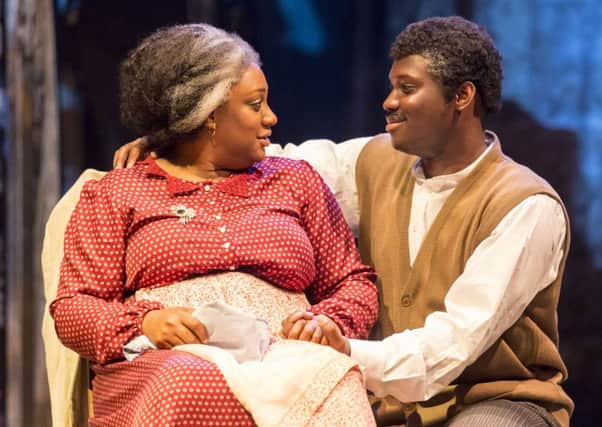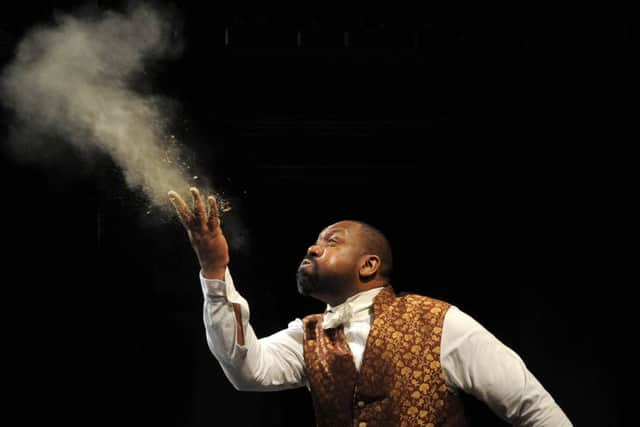Lloyd Webber and a simmering drama of racial tension, on stage and off


The revival of Show Boat, Jerome Kern and Oscar Hammerstein’s musical set on a Mississippi riverboat in the segregated American south, garnered rave reviews, not least for the rendition of Ol’ Man River by its star, a young Mancunian actor called Emmanuel Kojo.
But, it emerged today, the simmering back story of racial tension was not confined to the action on stage.
Advertisement
Hide AdAdvertisement
Hide AdMr Kojo, who has been nominated for a UK Theatre Award for his performance, broke cover to talk about an institutional bias against black and minority actors on the British stage, in a report commissioned by the producer Sir Andrew Lloyd Webber.


It describes the theatre industry as “hideously white”, and warns it risks becoming irrelevant if it does not fix the disparity between “a desire for change and practical implementation”.
Mr Kojo, whose drama school training was funded by the Andrew Lloyd Webber Foundation, said in the report: “People always say that black actors have to work three times as hard to establish themselves as their white counterparts and unfortunately it is true.
“Look at all the British leading actors in Hollywood, they are nearly all white and went to public school.”
Advertisement
Hide AdAdvertisement
Hide AdHe also highlighted a lack of training for make-up artists who work with black actors.


“It makes you feel so little,” he said. “It’s just not good enough. It is really important for people to have the right training and realise that this is important.”
Mr Kojo, who is of Ghanaian descent and who reprised his role as Joe in Show Boat at the New London Theatre earlier this year, added: “I have never identified myself as a black actor, I have always just thought of myself as an actor, but since starting in this profession I have been made aware that I am a black actor.
“We won’t be equal until there is no prefix when people talk about us.”
Advertisement
Hide AdAdvertisement
Hide AdIn the report’s introduction, Lord Lloyd Webber warns: “I passionately believe that the stage needs to reflect the diversity of the UK population or it risks becoming sidelined.”
He urges “responsibility and specific action” from organisations and individuals across the industry including “arts sector bodies, drama schools, theatre producers, actors, creative teams and philanthropists”.
The report says: “If the situation continues, there is a real danger that not only will black and Asian young people stay away from the theatre as a profession, they will stay away as punters and without them in the audience, theatres will become unsustainable, as they are forced to compete for a dwindling ageing, white, middle class audience.”
The report includes interviews with more than 60 actors, theatre directors, drama students and teachers.
Advertisement
Hide AdAdvertisement
Hide AdIt found students from minorities came up against “financial barriers” and warned drama teaching and theatre visits in state schools are under threat.
It also revealed minority actors were forced to turn to the USA for professional breaks, and urges drama schools to provide finance so “50pc of places are accessible to students for low-income backgrounds”.
It calls on producers, directors and creative teams to ensure “colour blind” auditions for non-race specific roles.
The criticism in the Lloyd Webber report was echoed by Nick Ahad, who has been The Yorkshire Post’s theatre critic for the past 12 years, and will premiere his own stage production, his fifth, in Lancaster on January 13.
Advertisement
Hide AdAdvertisement
Hide AdThe Chef Show, which is set in an Indian restaurant, has a cast of two - with both roles played by Asian actors.
However, Mr Ahad, who has Bangladeshi heritage, maintained that a lack of diversity in the UK’s theatres remains a long-running issue.
He said: “It is heartening that someone of Andrew Lloyd Webber’s status and profile has spoken out, but using language such as ‘hideously white’ is perhaps not that helpful.
“But the truth of the matter is that there are so few black and ethnic minorities in theatre.
Advertisement
Hide AdAdvertisement
Hide Ad“We have been talking about this for the last 10 years, and while it is good that the issue has been raised again, how many more times will it have to be discussed before there is any real change?”
Among the highest-profile productions in recent years to feature a black actor in the lead role was Othello, sataged in 2009 by the Halifax-based Northern Broadsides company. It starred Sir Lenny Henry, who has been a vocal campaigner for more diversity in the media.